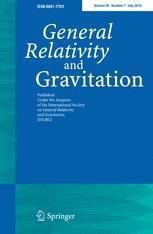GRG Editor's Choice: Collisional super-Penrose process and Wald inequalities
 Tanatarov, I.V. & Zaslavskii, O.B., Collisional super-Penrose process and Wald inequalities, Gen Relativ Gravit (2017) 49: 119. https://doi.org/10.1007/s10714-017-2281-0
Tanatarov, I.V. & Zaslavskii, O.B., Collisional super-Penrose process and Wald inequalities, Gen Relativ Gravit (2017) 49: 119. https://doi.org/10.1007/s10714-017-2281-0
Editor's Choice (Research Article)
First Online: 16 August 2017
"The paper describes original and interesting results concerning a subject which is of fundamental importance for the black hole physics and astrophysics."
Abstract:
We consider collision of two massive particles in the equatorial plane of an axially symmetric stationary spacetime that produces two massless particles afterwards. It is implied that the horizon is absent but there is a naked singularity or another potential barrier that makes possible the head-on collision. The relationship between the energy in the center of mass frame Ec.m. and the Killing energy E measured at infinity is analyzed. It follows immediately from the Wald inequalities that unbounded E is possible for unbounded Ec.m. only. This can be realized if the spacetime is close to the threshold of the horizon formation. Different types of spacetimes (black holes, naked singularities, wormholes) correspond to different possible relations between Ec.m. and E. We develop a general approach that enables us to describe the collision process in the frames of the stationary observer and zero angular momentum observer. The escape cone and escape fraction are derived. A simple explanation of the existence of the bright spot is given. For the particular case of the Kerr metric, our results agree with the previous ones found in Patil et al. (Phys Rev D 93:104015, 2016).
The authors:
Dr. Igor Tanatarov is an Associate Professor at the Department of Physics and Technology of V.N. Karazin Kharkiv National University, Ukraine. Dr. Oleg B. Zaslavskii is a Senior Researcher at at the Department of Physics and Technology of V.N. Karazin Kharkiv National University, Ukraine and N.I. Lobachevsky Institute of Mathematics and Mechanics, Kazan Federal University, Russia.
GRG Editor's Choice:
In each volume of GRG, a few papers are marked as “Editor’s Choice”. The primary criteria is original, high quality research that is of wide interest within the community.
